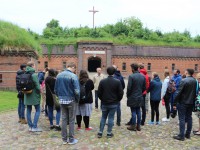“Venues of Victims // Venues of Perpetrators” - Intense working days in Puszczykowo, Poland

In the framework of the project “Venues of Victims // Venues of Perpetrators: Mapping, Decoding & Processing the Role of Historical – Civic Education in (European) Youth Work”, youth leaders and representatives of international project partners from Belgium, Croatia, Czech Republic, Estonia, France,
Germany, Lithuania, Norway, Poland, Portugal, Slovenia, and Spain met from 14th-20th May 2018 in Puszczykowo near Poznan.
Besides visiting the memorial of the former concentration camp “Fort VII” in Poznan, the participants of the training course had a yielding exchange with the guest speakers from internationally recognized institutions: Simon Lengemann (Federal Agency for Civic Education, BpB), Georg Pirker (Association of German Educational Organizations, AdB) and Karolina Dziełak (European Network Remembrance and Solidarity, ENRS). The focus of the training course was on the content related preparation of the summer camp in Croatia. In total, six working groups were created to prepare the workshops and the accompanying program. The working groups are then divided into three modules according to their thematic focus.
Module A (working groups 1 and 2) focuses on the interrelations between contemporary ideological order and historical representations. While working group 1 scrutinizes, above all, the museums' representations of the past, working group 2 focuses on the monuments and street names as well as ideologically motivated renaming of streets, removals of the monuments or their reinstatements in the aftermath of the political turns. The workshops and accompanying programs shall draw attention to the central thesis that history is always a selective and subjective representation of the past, whose representations should therefore always be critically scrutinized.
Module B (working groups 3 and 4) is dedicated to the totalitarian and authoritarian forms of rule in Europe during the 20th century. Thereby, working group 3 focuses on ideologically motivated violence in the context of World War II. The theme is taken up by visits to the memorial sites of Jasenovac (former concentration camp) and Lipa (a village destroyed in the brutal act of revenge by the Axis troops) and placed in a broader European and global context of the World War II. Meanwhile, working group 4 focuses on post-war dictatorships. The topic of ideologically motivated arbitrariness and violence after 1945 is taken up by visiting the former re-education camp on the notorious Adriatic island of Goli (Goli Otok). In contrast, a positive (self-)image of the Yugoslav post-war dictatorship is also presented to the participants by visiting the museum on Brijuni islands (former summer residence of Tito). Beyond the demonstration of the complexity of a developmental dictatorship, the juxtaposition of the two representations of Yugoslav state socialism provides a good starting point for further discussions at the interface between historical-political education and human rights education.
Module C (working groups 5 and 6) focuses on contemporary history and contemporary challenges in Croatia and beyond. Group 5 is dedicated to the collapse of the socialist order in Eastern Europe and violence in the context of post-socialist transformation, as well as the current review of the experience of violence in Croatia and other post-Yugoslav countries. The significance of the war heritage for the creation of a peaceful post-war order in Vukovar, meanwhile, is scrutinized by group 6, which focuses on the contemporary dynamics and perspectives of the shrinking small town. In addition, group 6 will design the joint activities with representatives of the local youth organization in Vukovar and moderate the discussion with participants of the partner organization in the frame of the project “In Between?” of the European Network Remembrance and Solidarity (ENRS) in Rijeka.
The event led by Boris Stamenic and Markus Rebitschek (EJBW), are also responsible for the overall project. “Venues of Victims // Venues of Perpetrators: Mapping, Decoding & Processing the Role of Historical – Civic Education in (European) Youth Work” is implemented in cooperation with In Flanders Fields Museum (Belgium), Documenta - Center for Dealing with the Past (Croatia), Ústav pro studium totalitních režimů (Czech Republic), Sihtasutus Eesti Mälu Instituut (Estonia), Maison d'Izieu - mémorial des enfants juifs exterminés (France ), Stiftung Europäische Jugendbildungs- und Jugendbegegnungsstätte Weimar (Germany), Lietuvos gyventoju genocido ir rezistencijos tyrimo centras (Lithuania), Narviksenteret (Norway), Stowarzyszenie "Jeden Świat” (Poland), UMAR - União de Mulheres Alternativa e Resposta (Portugal), SOCIALNA AKADEMIJA - zavod za izobraževanje, raziskovanje in kulturo (Slovenia) and Gernika Gogoratuz Centro de Investigación por la paz (Spain).
For further information please contact:
Dr. Boris Stamenić
Programme Coordinator of the Project "Venus of Victims, Venues of Perpetrators: Mapping, Decoding & Processing the Role of Historical - Civic Education in (European) Youth Work"



